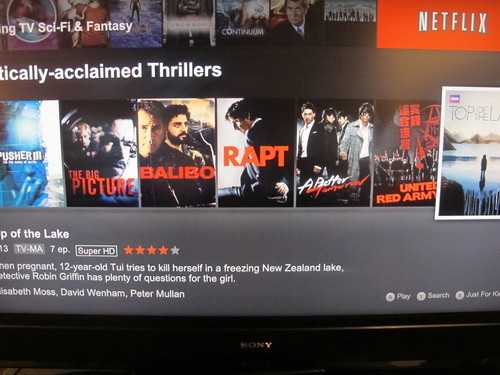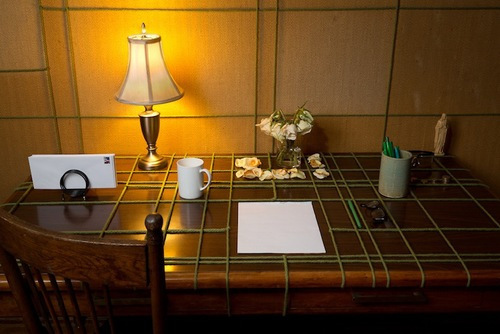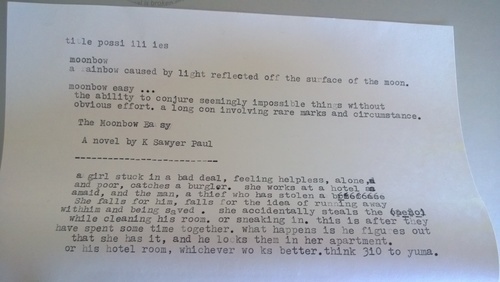Sawyer Paul's Blog, page 67
December 24, 2013
The Power of Empathy
December 22, 2013
More Things

Put plainly, our brains think that acquiring new stuff will make us happy, but we're not entirely sure why our brains work this way. I'm not, however, happy about the course of the word "hack." I am not generally a bomb-thrower, but I wrote this piece in a deliberately provocative way. I’d never heard of the south Hamptons, and here the term was, charged with exotic meaning! I don't know. "Don't you have a little passage memorized?" I ask. "A little Shakespeare, maybe? 'Oh, for a muse of fire,' something like that?" I want my watch, glasses, toaster, light switches, thermostat, and door locks to use connectedness to make the world a better place–by reducing energy usage, decreasing waste, and improving my happiness and convenience. Put another way: While our designs are more sophisticated, they are, as ever, progressive enhancements on top of a story that must be able to survive without them. Lest my curmudgeonliness be mistaken for misanthropy, let’s be clear: There’s nothing wrong with happiness at work. Certainly the promise of continual human progress and improvement is alluring. But there is a danger there, too — that in this more perfect future, failure will become obsolete. My motivation to publish stories that reveal my ugliest moments has less to do with bravery than with bearing witness. Young women are often barred from feeling the easy pleasure that comes with reading and identifying with the classics. But we also benefit from a critical perspective on these books that many of our male peers don’t have. We don’t see ourselves in them, so we grow up challenging them.


December 18, 2013
Red Meteor
December 15, 2013
My first scrawlings for Moonbow Easy
December 14, 2013
Modifier Key

Sometimes I'll just ball up. I can't take the world and I don't have the fuel. I get the wrong kind of text message from the wrong kind of friend and I'm out of operation for a long weekend. That's a misfire, a neuron or socket malfunctioning. It shouldn't work like that. I should be able to brush off things, but there's too much purchase. I stick.
I'll just stare out for a little bit and wonder if other people are like this, if this is normal. I ask myself that a lot. Is what I'm doing normal? It's a kind of ghost calibration. I'll order food and realize I have no money. Inaction. Things get cancelled. I cancel. I can't say what's wrong. It's just an empty box. It's just a fog. I want to be able to zoom in and get some detail, hold down a modifier key and feel like a prize fighter. I want to roll weird dice and move upward, and feel like ascension means something. But every step feels like entering a pie eating contest.


December 13, 2013
Lattice and technical difficulties
I've published 6 issues of Lattice. I'm proud of each of them, both in the quality of work I've been able to muster, as well as the world-building I'd attempted. I looked at the idea of serial fiction as a way to slowly piece together a much larger object than simply a book. I looked at it as an evolution from the book, to this new thing that could only be done with specific technologies working together. Sync. Push. Subscription payments. Tiny file sizes. Readability on every single electronic device. That's exciting stuff, and Lattice worked with all of it to create the beginning of something great.
I'm sorry to bury the lead, but this is about what's going to happen next with Lattice. As of December 28, the app is being pulled from the iOS app store. As of February, lattice.periodical.co will shut down. Obviously, this isn't something I want to happen. But I'm not in control of the fortunes of Periodical, the company that helps me make Lattice such a great product. I looked at it as a partnership. I provided the raw content—my writing—and Periodical provided the excellent container. They pushed each issue to the iPhone, iPad, and Kindle, the three most popular reading devices in the world, and they created epub files subscribers could download and keep forever, to read on any reasonably modern device in the world. It was great.
Unfortunately, it looks like Periodical is shutting down, which means I have to find a new way to make Lattice work. I'm not going to rush into anything, and I want to make sure that the next platform (or platforms, as will be more likely) I choose will be something that'll last a long time, and will inspire me to work even harder on this amazing project of mine. From what I understand, readers will be receiving some kind of return on the last month of subscribing, but I don't have all the details. Contact Periodical if you have any questions. If you are a current subscriber, and have been meaning to download any of the issues for posterity, I'd suggest doing it pretty soon.
I'm sorry about this setback. I really shot for the sun with this one. I simply couldn't (and still can't) do the great work the folks at Periodical did by myself. And this is always the risk one takes when forming a relationship. It's one of the reasons I've remained adamantly independent my whole career. I don't feel like I made a mistake trying things out with Periodical. They made a great product, and offered a terrific service. I wish the best for them.
I know I'm going to leave some readers frustrated. If you've been following along with Lattice, you'll know there are three ongoing narratives that feel like they're just getting started. Trust me, they are. I have extensive work on all three in the can, and can't wait to share this interweaving mystery with everyone. So don't worry, you will not have to wait long to continue reading Skypunch, The Moonbow Easy, and Corona Gale.


Netflix connect five
I love Netflix coincidences, where several films line up in a row of design similarities. Here we have five posters with identical design choices: broody men, giant red font. The only outlier is the fourth one, where they've gone with a less blocky typeface.



December 12, 2013
More Things

It’s Hardly Noticeable XVIII by Photographer John William Keedy
If a former athlete wants to remain in the public eye, there aren’t many options besides low-grade celebrity. | But on network television, where the prices charged for advertising depend on ratings, comparative popularity matters a lot. | A +2 Dwarven Waraxe | Grouped together, these ruminations, cheers, squibs, and essays will be a chronicle of reading and good books from every era. | Their creators describe them essentially as online performance art, never intended to be taken as fact. | Above all things, the past is unchanging and unapologetic, but the future (so terrifyingly depicted here) is mutable. | You didn’t do a bunch of push-ups to get taller, and you didn’t work real hard in the womb to be born in Wisconsin. | Something curious happened after I finished Device 6 the third time. The English major in me found his resolution. | You will never speak to Simone again, which will hurt for an unreasonable amount of time.


Steve Carell: What I've Learned
Reading reviews doesn't make you better at what you do.
When I read this, I immediately thought of this week's Back to Work, and the idea that criticism can be, in many respects, useless to the creative process.
See: Nintendo doesn't care what you think.
Also, Steve Jobs: "Your time is limited, so don't waste it living someone else's life. Don't be trapped by dogma — which is living with the results of other people's thinking. Don't let the noise of others' opinions drown out your own inner voice."
Also, in the same issue of Esquire, Steve Coogan: "Fuck everyone's advice."















